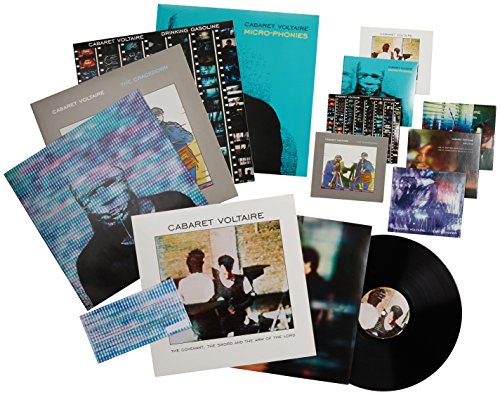
Cabaret Voltaire
#8385 (Collected Works 1983-1985)
Release Date: Dec 17, 2013
Genre(s): Electronic, Pop/Rock
Record label: Mute
Music Critic Score
How the Music Critic Score works
Buy #8385 (Collected Works 1983-1985) from Amazon
Album Review: #8385 (Collected Works 1983-1985) by Cabaret Voltaire
Excellent, Based on 4 Critics
Based on rating 9/10
One major component in an in-depth series of remastered releases overseen by founding member Richard H. Kirk, #8385 Collected Works 1983-1985 contains a core of The Crackdown, Micro-Phonies, Drinking Gasoline, and The Covenant, the Sword and the Arm of the Lord. An additional disc compiles crucial 12" versions -- the format that allowed this era of CV to truly thrive -- while another features unreleased material recorded during the same period.
Based on rating 4/5
In the mid-80s, arch industrial pioneers Cabaret Voltaire took a surprising turn: out with the sandblasted old, in with the modernist, populist new. Spread across six CDs, four LPs, and two DVDs, #8385 offers an extensive audio-visual survey of this second phase of the band’s career. We start with The Crackdown, the band’s fourth studio album, and the first they made after the departure of founding member Chris Watson (who took up a job at Tyne Tees Television) and a move from Rough Trade to Virgin (via Stevo’s Some Bizarre imprint).
Based on rating 7.5/10
Staunchly anti-commercial, perennially perched on the brink of success and highly influential, Sheffield’s Stephen Mallinder and Richard H Kirk – aka Cabaret Voltaire – have now reached heritage status through the fusion of electronics and rock, something they strived to mould together since their inception forty years ago. Intent on updating the sounds of Roxy Music and Berlin-era David Bowie, they re-imagined them as dance floor tracks made for seminal nightclubs such as New York’s Dancetaria and a pre-ecstasy era Hacienda, but with the unmistakable aural smog of both steel cities, their own Sheffield and Detroit. In fact, many of the more danceable tracks from this box set could easily be twinned with Juan Atkins’ seminal early electro rock project Cybotron.
Opinion: Excellent
It has now been 40 years since the formation of Cabaret Voltaire, one of Sheffield's single most enduring contributions to music worldwide, and, in both a musical and cultural perspective, it seems a fitting time to revisit their work. In the polarised era that they existed in for the first decade of their career, with the transition from Britain's grim economic decline in the 70s to the false promises of the beginnings of New Liberalism in the early 80s, a highly-charged political climate caused many decisions by artists and most everyone else to be implicitly interpreted as politically weighted. Starting as they did on Rough Trade, an organisation who enthusiastically dirtied their hands in the movements of the times, it would have been difficult for the Cabs to avoid these currents, and if the lyrical content of their material seemed to dodge direct references to contemporary events, it was hard to ignore the revolutionary sound of the group, which quickly earned them the ire of punks and their successors and cast the group perpetually on the fringes of popular music.
'#8385 (Collected Works 1983-1985)'
is available now

